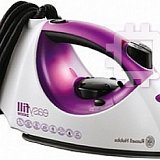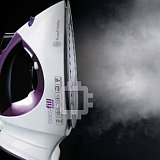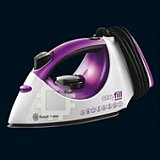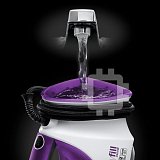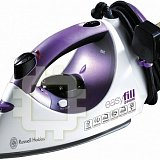Russell Hobbs 17877-56: инструкция
Характеристики, спецификации
Инструкция к Утюгу Russell Hobbs 17877-56

instructions 2
инструкции (Русский) 46
Bedienungsanleitung 6
pokyny (Čeština) 50
mode d’emploi 10
pokyny (Slovenčina) 54
instructies 14
instrukcja 58
istruzioni per l’uso 18
upute 62
instrucciones 22
navodila 66
instruções 26
οδηγίες 70
brugsanvisning 30
utasítások 74
bruksanvisning 34
talimatlar 78
instruksjoner 38
instrucţiuni 82
käyttöohjeet 42
инструкции (Български) 86

2
Read the instructions, keep them safe, pass them on if you pass the appliance on.
Remove all packaging before use.
A IMPORTANT SAFEGUARDS
Follow basic safety precautions, including:
1 This appliance must only be used by or under the supervision of a responsible adult. Use and
store the appliance out of reach of children.
2 Don’t put the appliance in liquid, don’t use it in a bathroom, near water, or outdoors.
3 Route the cable so it doesn’t overhang, and can’t be tripped over or caught.
4 Don’t iron clothing while it’s being worn – you’ll injure the wearer.
5 Don’t touch the soleplate, and keep away from the steam it emits.
6 Don’t use the iron in the vicinity of children.
7 Use the iron, or set it on its heel, on a stable, level, heat-resistant surface, preferably an
ironing board.
8 Don’t leave the iron unattended while plugged in, or while it’s standing on the ironing board.
9 Unplug the iron before filling, before cleaning, and after use.
10 Sit the iron upright when you’re not ironing.
11 Don’t use accessories or attachments other than those we supply.
12 Don’t use the appliance for any purpose other than those described in these instructions.
13 Don’t scratch the soleplate – avoid buttons, zips, etc.
14 The appliance has a protective thermal fuse, which will blow if it overheats. If this happens,
the appliance will stop working, and must be returned for repair.
15 Don’t operate the appliance if it’s dropped or damaged, or if it malfunctions or leaks.
16 If the cable is damaged, it must be replaced by the manufacturer, its service agent, or
someone similarly qualified, in order to avoid hazard.
household use only
U BEFORE USING FOR THE FIRST TIME
1 Remove any labels, stickers or packaging from the iron and soleplate.
2 Don’t worry if the iron smokes a bit at first, it’ll stop as the element cures.
3 Iron an old piece of cotton fabric, to clean the soleplate.
4 Press the # and * buttons 3 or 4 times, to check them.

3
instructions
diagrams
3 steam control
6 steam vents
1 temperature control
# high steam
7 reservoir
5 mark
S no steam
8 heel
S steam available
4 spray nozzle
9 water inlet
2 light
5 soleplate
C PREPARATION
5 Check for textile care symbols (i j k l).
6 Iron fabrics needing low temperatures j first, then those that need medium temperatures
k, and finish with those needing high temperatures l.
X FILLING
7 The iron may be used with tap-water, but if you live in a hard-water area, you should use
distilled water (not chemically descaled water).
8 If you buy distilled water, check that it is marketed as suitable for irons.
9 Don’t add anything to the water – you’ll damage the iron.
10 Unplug the appliance.
11 Set the temperature control to •. Set the steam control to S.
12 Hold the iron with the heel uppermost.
13 Press the V button, and keep it pressed in. This opens the valve
14 Pour water into the heel till it stops disappearing into the reservoir, and starts to back up.
15 Release the V button. This closes the valve.
16 Tip excess water out of the heel.
17 Wipe up any spillage.
C SWITCH ON
18 Set the temperature control to •.
19 Sit the iron on its heel.
20 Put the plug into the power socket.
21 Turn the temperature control to bring the setting you want (see the guide below) next to the
5 mark. The light will glow.
22 When the iron reaches the set temperature, the light will go off.
23 It will then cycle on and off as the thermostat operates to maintain the temperature.
temperature setting guide
label marking temperature setting
j cool – nylon, acrylics, polyester •
k warm – wool, polyester mixtures ••
l hot – cotton, linen •••/max
i do not iron
, If the instructions on the fabric label differ from this guide, follow the instructions on the
label.
C REDUCING TEMPERATURE
24 Reducing temperature takes longer, as the appliance has to lose heat.
25 Organise your ironing so you don’t need to reduce the temperature (“preparation” point 6).
h STEAM IRONING
26 If you intend to use steam, the temperature setting must be S or higher.
27 If you don’t, you’ll get water on your clothes, not steam.
28 Set the steam control to the setting you want (S = no steam, S = low, # = high).
29 Wait till the light goes off, then start ironing.

4
k SPRAY
, Water spotting affects some fabrics. Test this on a hidden part of the fabric.
30 This function works with dry or steam ironing, as long as there is water in the reservoir.
31 Lift the iron off the fabric.
32 Aim the spray nozzle at the fabric.
33 Press the * button.
34 You may have to press it 2 or 3 times to pump water through the system.
j SHOT OF STEAM
35 This function works with dry or steam ironing, as long as there is water in the reservoir.
36 If you intend to use steam, the temperature setting must be S or higher.
37 Check that there is water in the reservoir.
38 Lift the iron off the fabric.
39 Press the # button.
40 You may have to press it 2 or 3 times to pump water through the system.
41 Leave 4 seconds between shots, to let the steam build up.
n DRY IRONING
, If you’re going to be dry ironing for 20 minutes or more, empty the reservoir first, to avoid
spontaneous bursts of steam.
42 Set the steam control to S.
43 Wait till the light goes off, then start ironing.
l VERTICAL STEAMING
44 Remove wrinkles from hanging clothes, hanging curtains, and furnishing fabrics.
45 Check that there is adequate ventilation behind the fabric, otherwise moisture may build up,
causing mildew.
46 Check that there is nothing behind the fabric that may be damaged by the steam.
47 Check that pockets, turn-ups, and cuffs are empty.
48 Check that there is water in the reservoir.
29 Set the temperature control to max. Set the steam control to S.
50 Lift the iron off the fabric.
51 Press the # button.
52 You may have to press it 2 or 3 times to pump water through the system.
53 Leave 4 seconds between shots, to let the steam build up.
C AFTER USE
54 Set the temperature control to •. Set the steam control to S.
55 Unplug the appliance.
56 Press the V button, and keep it pressed in. This opens the valve
57 Hold it over a sink, turn it upside down, and drain the water from the reservoir, via the water
inlet.
58 Release the V button. This closes the valve.
59 Sit the iron on its heel.
60 Leave it to cool down completely.
61 When it’s cold, wipe off any moisture, and wind the cable round the heel.
62 Store the iron on its heel, to avoid corrosion and damage to the soleplate.
C SELF CLEAN
63 To prevent scale building up, use the self clean function at least monthly in normal water
areas, more often in hard water areas.

5
, Products returned under guarantee with faults due to scale will be subject to a repair charge.
64 You’ll need a basin or a large bowl to catch the water coming out of the soleplate.
65 Fill the reservoir to the max mark.
66 Set the temperature control to max. Set the steam control to S.
67 Sit the iron on its heel.
68 Put the plug into the power socket.
69 Wait till the light goes off.
70 Hold the iron over the basin or bowl, with the soleplate down.
71 Move the steam control past #, to C, and hold it there.
72 Gently move the iron to and fro.
73 Water and steam will wash scale and dust through the soleplate.
, Keep clear of the escaping water and steam.
74 Carry on till the reservoir is empty.
75 Set the steam control to S.
76 Unplug the iron, and sit it on its heel to cool.
77 When it’s cold, wipe off any moisture, and wind the cable round the heel.
78 Store the iron on its heel, to avoid corrosion and damage to the soleplate.
e ANTI-SCALE
79 The anti-scale agent incorporated in the iron helps prevent the build-up of scale.
80 Don’t use a descaling solution, or you’ll destroy the anti-scale agent.
C CLEANING
81 Unplug the iron, and sit it on its heel to cool.
82 Clean the outside surfaces of the appliance with a damp cloth.
83 Remove spots from the soleplate with a little vinegar.
84 Store the iron on its heel, to avoid corrosion and damage to the soleplate.
H ENVIRONMENTAL PROTECTION
To avoid environmental and health problems due to hazardous substances in electrical
and electronic goods, appliances marked with this symbol mustn’t be disposed of with
unsorted municipal waste, but recovered, reused, or recycled.

6
Lesen Sie die Anleitung, bewahren Sie sie auf und falls Sie das Gerät an Dritte abgeben, geben
Sie auch die Anleitung mit.
Entfernen Sie die Verpackung vollständig, bevor Sie das Gerät einschalten.
A WICHTIGE SICHERHEITSHINWEISE
Beachten Sie bitte folgende grundlegende Vorsichtsmaßnahmen:
1 Dieses Gerät ist nur von einem oder unter der Aufsicht eines verantwortungsvollen
Erwachsenen zu benutzen. Das Gerät darf nur außer Reichweite von Kindern benutzt bzw.
aufbewahrt werden.
2 Gerät keinesfalls in Flüssigkeit tauchen, in einem Badezimmer, nahe Wasser oder im
Freien benutzen.
3 Legen Sie das Kabel so, dass es nicht überhängt und man nicht darüber stolpern bzw. sich
nicht darin verfangen kann.
4 Bügeln Sie keine Kleidung direkt am Körper - Sie könnten sich oder andere Personen
verletzen.
5 Berühren Sie nie die Bügelsohle und halten Sie sich vom austretenden Dampf fern.
6 Benutzen Sie das Bügeleisen nicht in der Nähe von Kindern.
7 Nutzen Sie das Bügeleisen oder stellen Sie es auf das Heck, auf einen planen, sicheren und
hitzebeständigen Untergrund, am besten auf ein Bügelbrett.
8 Lassen Sie das Bügeleisen nicht unbeaufsichtigt, während es angeschlossen ist oder während
es auf dem Bügelbrett steht.
9 Ziehen Sie den Stecker beim Befüllen, Reinigen und nach dem Gebrauch.
10 Stellen Sie das Bügeleisen aufrecht hin wenn Sie nicht bügeln.
11 Bitte keine Zubehörteile oder Aufsätze verwenden, die nicht von uns geliefert wurden.
12 Benutzen Sie das Gerät ausschließlich zu den in diesen Anweisungen beschriebenen
Zwecken.
13 Achten Sie darauf, dass Sie die Bügelsohle nicht verkratzen – vermeiden Sie Knöpfe,
Reißverschlüsse, etc.
14 Das Gerät hat eine Sicherheitsabschaltung, welche bei Überhitzung einsetzt. Wenn dies
geschieht stoppt das Gerät und muss zur Reparatur gegeben werden.
15 Verwenden Sie das Gerät nicht, wenn es tropft oder beschädigt ist, Fehlfunktionen zeigt oder
undichte Stellen hat.
16 Weist das Kabel Beschädigungen auf, muss es vom Hersteller, einer Wartungsvertretung des
Herstellers oder einer qualifizierten Fachkraft ersetzt werden, um eine mögliche Gefährdung
auszuschließen.
Nur für den Gebrauch im Haushalt geeignet
U VOR ERSTMALIGEM GEBRAUCH
1 Entfernen Sie alle Etiketten, Aufkleber oder anderes Verpackungsmaterial vom Bügeleisen
und der Bügelsohle.
2 Keine Sorge, wenn das Bügeleisen zu Beginn etwas raucht, es wird aufhören, wenn das
Kleidungsstück trocknet.
3 Bügeln Sie ein altes Stück Baumwollstoff um die Bügelsohle zu reinigen.
4 Drücken Sie die Tasten # und * oder 4 Mal, um ihre Funktionstüchtigkeit zu überprüfen.
C VORBEREITUNG
5 Lesen Sie die Pflegeanleitungen (i j k l).
6 Bügeln Sie Stoffe, die niedrige Temperaturen j brauchen zuerst, dann die mittleren k
und am Ende die, die hohe Temperaturen l benötigen.

